
Ritz London
It's the finest example of Edwardian England's style. Charlatan Magazine checks into the neoclassical masterpiece in the heart of London and experiences why this hotel's customs feel tried, true, and contemporary.
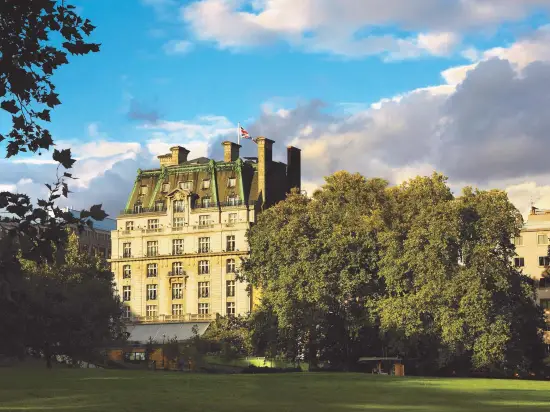
Ritz London
Irving Berlin’s "Puttin’ on the Ritz" was a hit in 1929, and referenced a then popular fad when flashily-dressed black Harlemites would parade up and down Lenox Avenue "spending ev'ry dime for a wonderful time.” The song remained popular in film and radio throughout the next decade, but in 1946 Berlin revised the lyrics to apply to “affluent whites strutting up and down Park Avenue” before quickly applying for the song’s copyright. A burgeoning middle class was emerging in the 20th century, and with their new status came a consumer in need of traditions, convention and style.
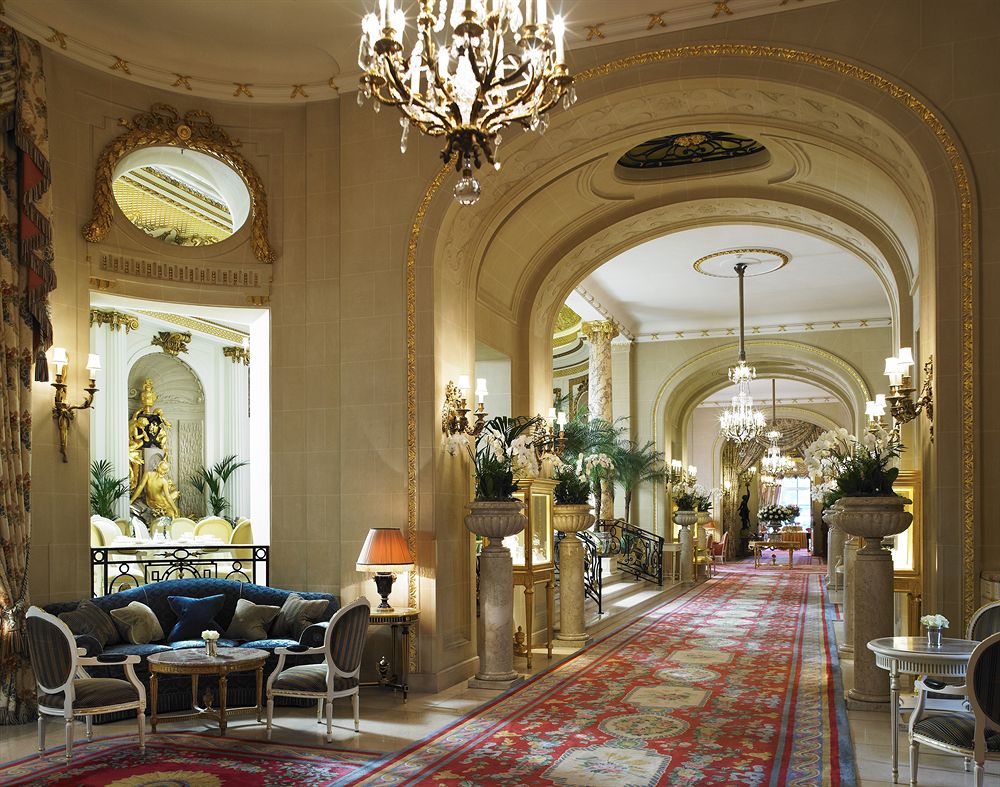
The Gallery via Ritz London
Such a homage to the class system wasn’t lost on the Swiss Hotelier, César Ritz. After managing some of the grand hotels of Europe, he was invited to London to manage the Savoy. By 1897, he’d put together what he described as “a little army of hotel men for the conquest of London.” The Savoy thrived under Ritz and attracted a distinguished clientele headed by the Prince of Wales. But when Ritz was dismissed from the Savoy, he retaliated by opening the celebrated Hotel Ritz in Paris the following year, and subsequently the Ritz Hotel in London in 1906: whose reputation almost preceded its opening as the most popular meeting place for the rich and famous. The Prince and his possy were regulars, as were the aristorcatic upper classes, all queuing toward architect Charles Mewes and Arthur Davis’ rendering of a full block of stately apartments in Paris set right in the heart of London.
Ritz personally managed the hotel for years, even installing a special bell in the entryway by which doormen could notify the staff of the impending arrival of royalty. The high standards to which he held his staff, and the ultimate luxury that he provided his guests, had been entirely foreign to Victorian Londoners, and the sensation he caused in the hotel industry precipitated a dramatic shift in the industry’s focus. Thanks to the new working middle class, who could now pay for their share of preferential treatment, Ritz acknowledged the converging classes and treated them both to a service of deference and privilege.
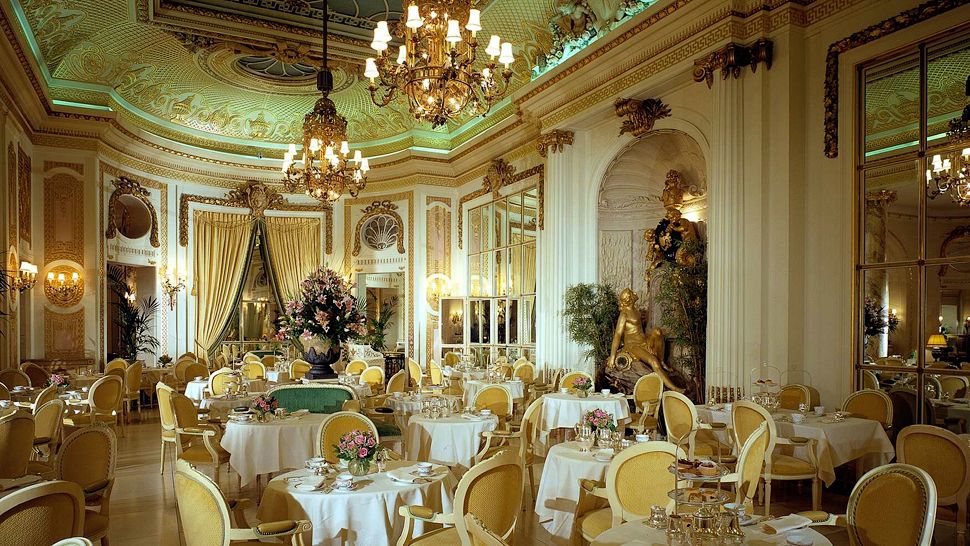
The Palm Court via Ritz London
I arrived at The Ritz Hotel in London as a Commoner, and was eager to experience what ‘Puttin on the Ritz' actually meant? However, their customs had eluded me when I realized that I wasn’t quite in compliance with their Dress Code. For men, in particular, a jacket and tie are required when visiting the Bar, Palm Court and restaurant. Having just arrived on an 8 hour flight from the US, I felt fancy in my new True Religion jeans, but to move anywhere else in the hotel would require a purchase.
As fate would have it, the dress code had only recently been amended, and graciously allowed me into the restaurant to enjoy the complimentary breakfast included in my standard room rate. Down the long Gallery I weft; peeking into the famous Palm Court and Rivoli Bar; which hints of adventure on the Orient Express. Over a century of ‘Afternoon Tea at the Ritz’ has been poured in this spectacular alcove, and I was humbled not by how professional the staff were but how polite and courteous the guests were to me as I schlepped along their corridors. Certainly I didn’t belong to this world: where a chorus of glass chandeliers linked by golden garlands thus usher me to the morning’s buffet. Palladian style doors open to an outdoor terrace where Piccadilly Circus beckons on one side and Buckingham Palace twinkles at the other. This wasn’t a delicate glimpse back in time, I thought, helping myself to both the salmon and champagne. It was an unadulterated return in time and to a place where cucumber sandwiches and polite conversations led to a Grand Conception.
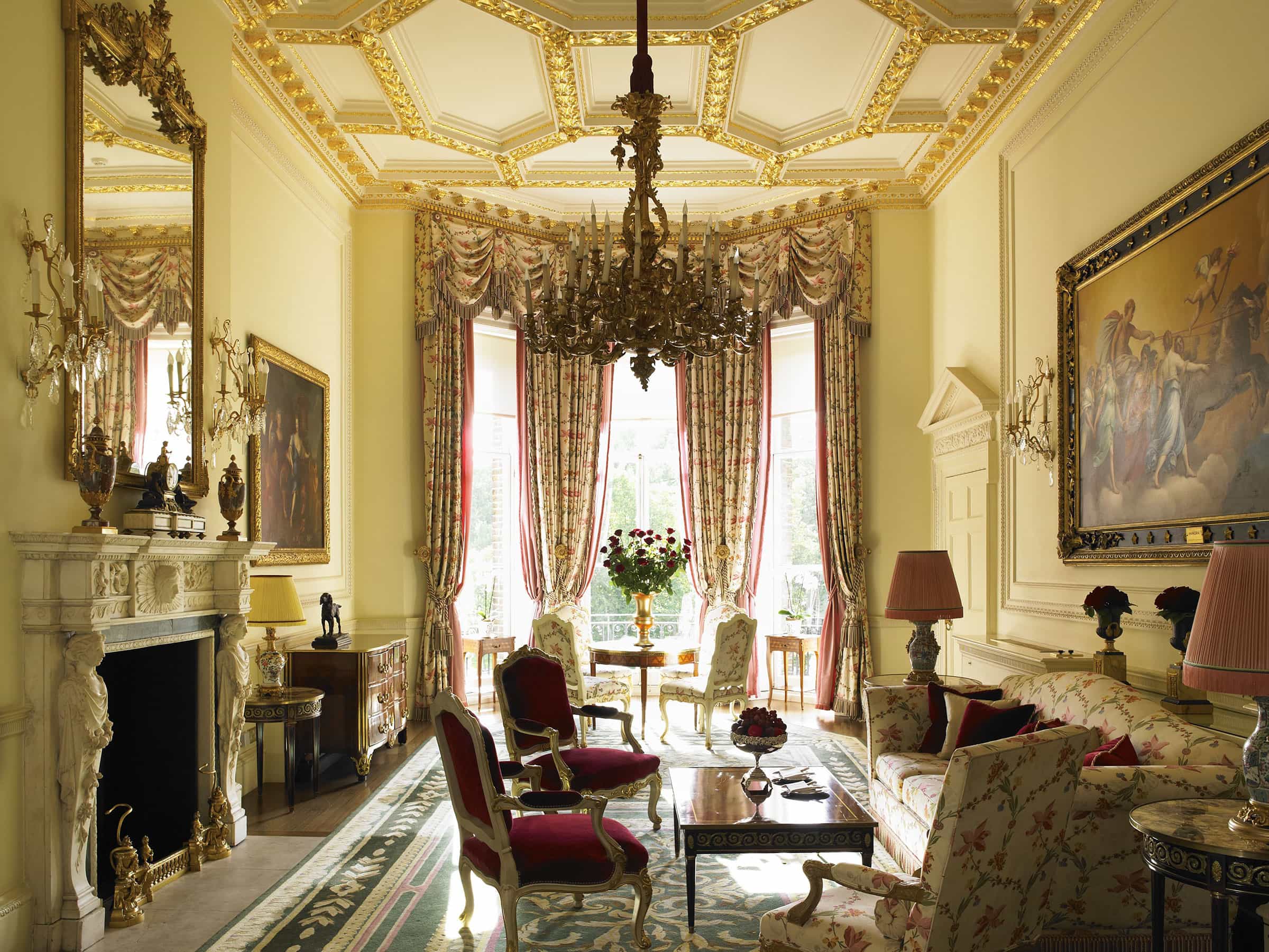
Guest Room via Ritz London
The sun never set upon the British empire during Victoria’s reign, and continues to shine on the Commonwealth today. That Churchill, de Gaulle, and Eisenhower used the Marie Antionette suite for summit meetings during World War II wasn’t lost on me as I pushed my way back through the gallery, up the marble staircase, past 113 utterly unique guest rooms, and into my very own private suite. A formal entrance welcomes me as I struggle with a room key that might have been cut for Shrek. This albatross wasn’t intended to be kept in one’s pocket, of course, but rather left at the front desk both upon leaving and returning to the hotel. Clever, I thought, keeping each guest in continual contact with the hotel’s incandescent smile.
The furnishings are in the style of Louis XVI, but I’m struck by complimentary fruit, chocolates, and handwritten note that welcomes me. Was this all for me, I wondered, just an average American? With Desperate Housewives and others behaving badly, it should be noted that foreigners are sometimes considered loud, aggressive and crude. Certainly I didn’t look or sound anything like the British upper classes. But as I made my way back thru the corridors and down the marble stairs, I couldn’t help but notice the deference with which I was received along the way. Not syncing with these conventions didn’t make a dent in their resolve to respond graciously, and with the most English of virtues—dignity.
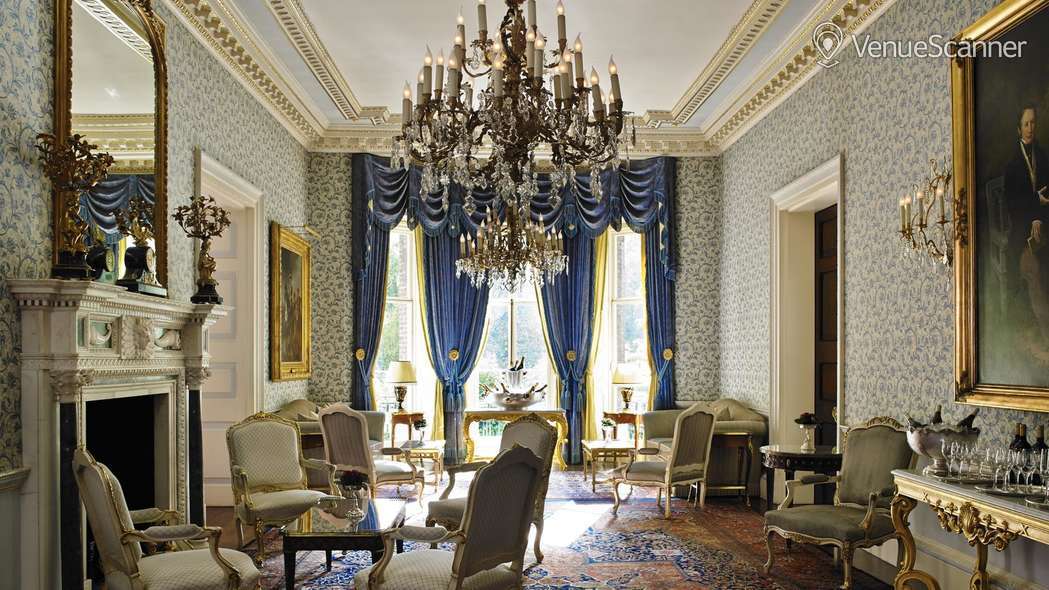
The William Kent Room via Ritz London
Originally just the house next door, The William Kent Room has recently been conjoined to the hotel adding yet another component of inclusion to her story. Whether Anna Wintour is laying out the September Issue of Vogue Magazine at this table for twenty, or Queen Elizabeth II is celebrating a private birthday affair, whats clear is that The Ritz Hotel shines as a spectacular event space for celebrities, royalty, and everyday people too. Even the basement has been meticulously renovated from a ballroom into a private casino that rivals any establishment in Monte Carlo. In fact, its a hot spot for celebrity couples like Tony Blair and Bill Clinton who I caught a glimpse of on my last night. Indeed, a friendship endures beyond their reigns, and into a legacy of Center Left Politics for which our two countries seem forever joined.
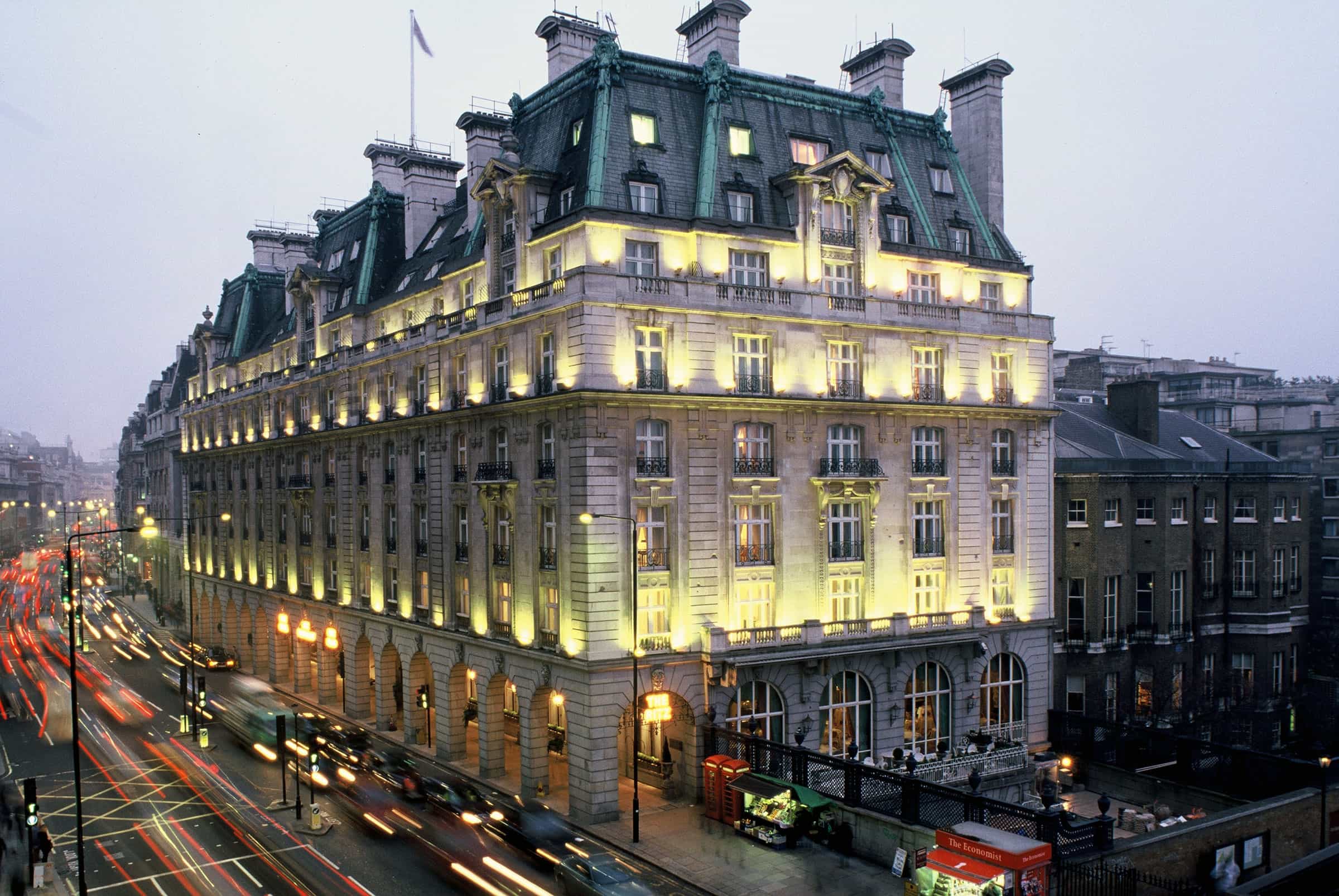
The Ritz London via Ritz London
When I returned to my room that evening, turndown festivities marshall me through the protocol of retiring, ahem, properly. The fruit has been replenished and the chocolates have been replaced, and I couldn’t help but wonder as I stared out the window on that particularly warm spring night whether I’d returned to the past, or, perhaps, actually glimpsed into the future? While every conceivable institution over the past century has 'modernized' in an attempt to stay current, it might just be that the King of Hoteliers had it right all along: For the ability to set fashions, rather than merely to follow them, is indeed the gilded centerpiece of a grand and enduring society. Next trip, perhaps, I’ll bring some slacks.
Archives








